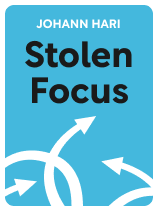

This article is an excerpt from the Shortform book guide to "Stolen Focus" by Johann Hari. Shortform has the world's best summaries and analyses of books you should be reading.
Like this article? Sign up for a free trial here .
Do you have difficulty processing information? Do you process information at a slower speed?
One of the reasons why many people process information at a slower speed is because of information overload. According to Johann Hari in Stolen Focus, our brains can’t keep up with the speed information is released.
Learn how the acceleration of information causes people to be slow to process information.
The Acceleration of Information
The amount of information available and the speed at which we encounter it is constantly increasing, but our brains are too slow to process this information. So we jump from one piece of information to the next without focusing. Although we tend to blame the internet for this problem, research shows that our inability to concentrate predates technology.
New topics have become popular more and more quickly since at least the 19th century, and the public has lost interest in them at the same speed. Researchers found that topics on Twitter trended for 17.5 hours in 2013 and only 11.9 hours in 2016. Similarly, data from Google books suggests that topics have been falling in and out of popularity more quickly with each passing decade before the internet set the churn rate at maximum speed.
The amount of information available determines the churn rate. The researchers built a mathematical model to determine what caused topics to quickly gain and lose popularity. They discovered a simple answer: When more information is available, people’s capacity to process it diminishes, and they move on to the next thing more quickly.
This acceleration of information is a problem for two reasons:
1) We can’t grapple with or solve complex problems. Since we’re constantly bombarded with new information we can’t keep up with, we have only a superficial grasp of every topic.
2) People with enough resources will find ways to protect themselves from the onslaught of information, such as taking a break from technology with a “digital detox.” Those with fewer resources will continue to be overwhelmed. (Shortform note: Some critics have characterized digital detoxes and similar strategies as privileges since many people rely on the internet for their livelihood and can’t afford to log off to support their well-being.)
Our Brains Are on Autopilot Mode
The reason we jump from one piece of information to the next without grappling deeply with any of it might be our natural tendency to default to autopilot mode. In Hyperfocus, Chris Bailey explains that, by default, our brains expend our attention in autopilot mode: Instead of choosing what to focus on in advance, we react to triggers that pique our interest.
Autopilot mode kept us alive in ancient times by keeping us alert to changes in our environment. The quicker we noticed danger, the quicker we could react to and avoid it. And the quicker we noticed gratifying things, the faster we could take advantage of them.
However, autopilot mode has one major drawback: It makes us prone to distraction. In autopilot, you automatically react to anything new, potentially dangerous, or gratifying. This inclination makes us susceptible to distraction because usually, the thing we’re trying to focus on is not as new, gratifying, or potentially dangerous as other things in the room.

———End of Preview———
Like what you just read? Read the rest of the world's best book summary and analysis of Johann Hari's "Stolen Focus" at Shortform .
Here's what you'll find in our full Stolen Focus summary :
- The seven factors causing the current attention crisis
- Johann Hari's three-part solution to gaining your attention back
- Why society needs to change, not just individuals






